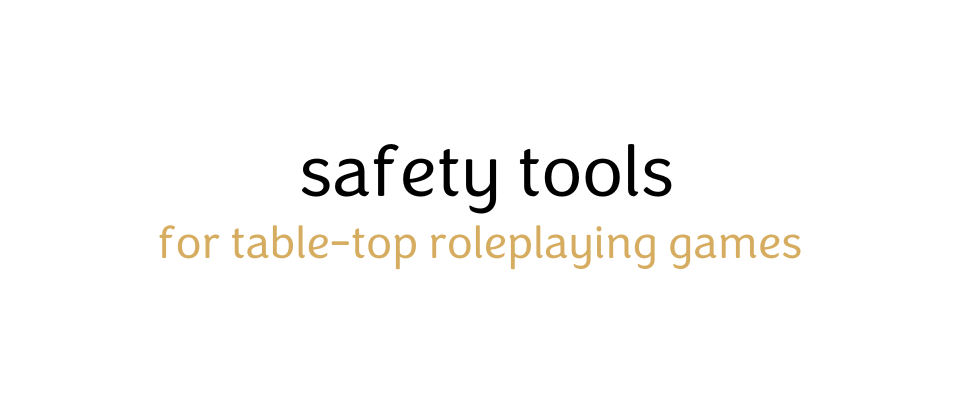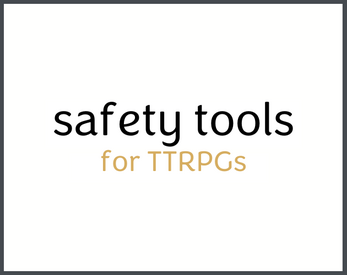
Safety Tools
A downloadable game
Before Play
Tips to make your game more therapeutic.
Session Zero
session zero is a game session run before a larger campaign in which you and your players talk about the upcoming campaign before you actually run it. Session zeros are intended to get you and your players all on the same page about the game you plan to play, and the campaign you plan to experience. Some DMs go in with little preparation, maybe not even knowing what campaign the group will play.
Session zeros help everyone manage their expectations about what the game is and what it is not. It helps tie the characters to one another, to the world in which they exist, and to the main story of the campaign. It helps everyone understand what kind of game you'll be playing and helps define the boundaries of that game.
Session zeros are a huge benefit when running longer campaigns.
C.A.T.S.
From the loremaster.io's excellent article on safety tools.
CATS stands for concept, aim, tone, and subject matter, the four areas of which should be pretty straight-forward in what they entail. But just in case, a quick run-through:
Concept – What is the general concept for your game? Defining which game system will be used already helps with this, as something like Dungeons & Dragons has a very different tone to Call of Cthulu.
Aim – Is the aim of your players to save the world from an otherworldly threat? Dispose of an autocratic ruler? Just to run around and help villagers with relatively innocent tasks?
Tone – While the baseline tone of the game can be set through the game system, even within the same system, there can be a lot of variation. Dungeons & Dragons can be a heroic fantasy epic, or it can be a gothic horror game – Be sure to define this clearly.
Subject matter – Will racism or slavery be a prominent element in your world? Are child soldiers recruited on the regular? Not all players will be comfortable with subject matters like these, so be sure to define so clearly if they feature.
It’s something that should be discussed before even playing, ideally when announcing the game in the first place. Especially when playing with strangers, it can make everyone more at ease to set up a framework simply stating – “This is what will be in the game”. If you want, this can of course be changed throughout, but I recommend sticking to the defined areas, out of respect for all of your players. Not everyone is able to speak up if things are suddenly changed, making them uncomfortable.
Lines & Veils
Before play, it’s usually a good idea to have a quick chat about Lines & Veils. These are themes, ideas, incidences, or types of violence players may not want to be included in their game.
Lines are hard lines in the game we do not cross. These are things that are not in the game at all. They are not alluded to or done off screen. They simply do not happen.
Veils are things that happen off-screen in a game. They are things that are allowed to happen but do not occupy “camera” time, as it were. The easiest way to deal with veils is to let the scene fade to black. You can describe the door closing on the room where an NPC is about to be tortured, but that’s it. You can say the two characters tumble into bed together and then that’s it.
Establish these at the beginning of your game; it only takes a couple minutes. Keep these in mind as you run your game. If you do not establish Lines & Veils, the X-card will be there in case of incidences where someone feels uncomfortable. It is often easier to know you may have to change parts of your game ahead of time than in the heat of the moment if you’re a GM who relies more heavily on prep.
Content Warnings
If your game has intense, problematic, or potentially harmful content, please let your players know before you start playing. All you need to say is what kind of content to expect, make sure everyone’s okay, and give them an opportunity to leave if they wish.
Tone Conversation
Before any game, it’s important to talk about what tone or overall feeling the game should have. This is a time to discuss if you want the game to be dark and gritty, or light and dreamy. This will help avoid a tone shift and also let players know what you will each be aiming for in terms of play. Any tone that makes anyone uncomfortable should be discussed before play.
During Play
Script Change, by Beau Jágr Sheldon
Script Change is a multi-function content, consent, and safety toolbox for collaborative creation and gameplay, useful for tabletop roleplaying games, board games, live-action roleplaying games, and even collaborative video games to help guide group decision-making.
The X-Card, by John Stavropoulos
The X-card is probably the most well-known safety tool out there and is frankly also one of the simplest. It consists of, quite simply, a physical piece of cardboard with a big “X” drawn on it, and if a scene has themes or actions that the player finds uncomfortable, then the player throws the card on the table, and GM skips the scene or otherwise diverts, no questions asked. loremaster.io
The Support Flower, by The Act Apart
The Support Floweris a non-verbal affirmative-consent player support tool for tabletop gaming that allows players to communicate boundaries without feeling like they are disrupting the game.
Hand Queues, by The Act Apart
Hand Queues are an attempt to equalize conversations by asking participants to observe non-verbal turn-taking signals. The goal is to allow a more diverse range of voices to be heard in group conversations, discussions, and games.
The Open Door Policy
Sometimes game content can get uncomfortable but we still want to play with it. And sometimes we need a break. The Open Door Policy is a way to allow yourself and your players to get up and leave the table, by saying they’re using the open door, to go cool down for a minute before coming back to the table. It is not asking to end play, just to allow them to catch their breath before play continues.
If your game has difficult content, we recommend talking about this policy to allow players space to hit pause or tap out when they need to.
After Play
The Check-In Toolkit, by Ash Kreider
The Check-In Toolkit is a trio of TTRPG emotional safety tools designed for online play via channels like Zoom and Discord.
The affordances of many common emotional safety tools are not ideal for online play; they often rely on visual signals, which makes the tool inaccessible to people who play with their camera off for reasons of anxiety or internet connection speed. Players are also more likely to be juggling multiple tabs, which makes it more likely for non-verbal signals to be missed. All of these things can make it difficult for players to rely on traditional safety tools in online play.
Instead, the Check-In Tool Kit uses key phrases to pause the conversation and establish what conversation is needed to establish safe bounds around the fiction. Additionally, because it can be difficult to interrupt play in progress, it also includes a tool for checking in between scenes and making sure that everyone's needs are being met.
WRAP, by Dissonance
WRAP• is an aftercare exercise designed to be used in tandem with your favorite tabletop roleplaying games. In just a few minutes facilitators of this rules-light mini-game can promote healthy attachment models and inject a dose of levity into otherwise serious roleplay experiences.
To play everyone at the table takes on the roles of method actors tasked with portraying our own characters in a dramatic play.
How does The Paladin feel about The Thief ’s roguish hi-jinks?
How might The Battle Babe react to their own demise?
WRAP• invites players to explore these questions and more in a safe environment free from the dangers and drama of our weekly campaign.

Comments
Log in with itch.io to leave a comment.
Cool display of resources and organization. It will be very handy. Thanks